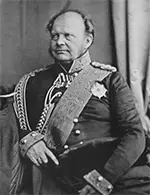The Unification of Germany
Part 3: Final Acts
A combination of droughts and food shortages caused major unrest multiple times in the 1830s and 1840s. As well, a modernization of manufacturing methods put many people out of work.  Tempers flared on a much larger scale in 1848, as a series of revolutions swept through Europe. The Austrian Empire had to yield its leader, its chancellor, and much ground this time around. Prussia cracked down hard on the uprising there, managing to suppress it for a time, but King Frederick William IV (right) eventually accepted the idea of a constitutional monarchy. The result was the Frankfurt Parliament, which proved unable to deliver on the promise of full representative government. By that time, the Zollverein was proving to be far more of a unifier than any political organ. In the absence of a strong legislative body, the king reversed many reforms. By this time, the advent of the railroad had brought German speakers closer together, literally and figuratively. Road travel and water travel had also improved at this time, enabling people to travel more freely and quickly; as a result, German speakers of one state visiting another state found many similarities with people there. Roads and railroads are often used to transport people and goods, certainly. As well, armies use roads and railroads. Such was the case with Prussia, especially, in the wake of the revolutionary fervor that was enveloping Europe in the first half of the 19th Century. As the 1860s began, Prussia had a large, well trained army and its leaders were looking for places to use it. 
The King of Prussia by this time was Wilhelm I. In 1862, he appointed as his chief minister Otto von Bismarck (right), a deft politician and planner who sought the unification of German-speaking states. Bismarck embarked on such a campaign using a variety of means. He encouraged greater membership in the Zollverein; more and more German states joined the customs union. He encouraged Prussia's allies and neighbors to join it in disputes and wars with other powers. Prussia and Austria fought against Denmark in 1864 over the right to own the duchies of Holstein, Lauenberg, and Schleswig. Two years later, the allies became enemies, fighting the Austro-Prussian War. Prussia reigned supreme, standing alone at the top of German-speaking states. Bismarck replaced the German Confederation with the North German Confederation, excluding primarily Austria but also four key southern German states who weren't keen to fall in line behind Prussia at the moment. 

To get those states on side, Bismarck prosecuted a war with France, which Prussia won just as handily as it had the conflict with Austria four years earlier. In a matter of weeks, Prussia, with south German states in tow, reigned supreme, inflicting defeat on France and claiming Alsace and Lorraine as part of the terms of surrender. German patriotism in the wake of this victory was at a fever pitch. Wasting no time, Bismarck proposed and completed the unification of Germany. On Jan. 18, 1871, King Wilhelm I was proclaimed Kaiser Wilhelm I of the new German Empire. First page > Early Years > Page 1, 2, 3 |
|
Social Studies for Kids
copyright 2002–2024
David White




